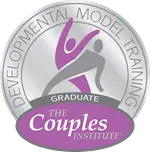People work hard for their insurance benefits, and it’s understandable for those who want to use them. There are several blog posts about insurance and couples therapy on this site, but the main point of this post is to focus on finding a developmental couples therapist. The insurance model is based on a diagnosis(es) of a mental illness(es) and treatment of the cause of that diagnosis. Developmental therapists do not pathologize, label, or stigmatize but instead look to help you grow. There is a myth that therapists only treat disease (although the insurance model encourages this) and that only coaches are proactive. Developmental therapists (who typically do not or cannot take insurance to handle couples therapy the right way) focus on your goals and future, and you move through different developmental couple stages.
Cardinal Point Counseling integrates many models of couples therapy (no one is good enough for everyone). Ellyn Bader’s Developmental Model is used to help you focus on your strengths and grow from there instead of focusing on fixing what is broken. A key component of the developmental model is realizing that it takes two to tango. So many people come to couple therapy wanting to fix their partner. Many see it as a competition. Many people new to couples therapy have a hard time seeing their role (yes, you have a role (with few exceptions)) in whatever is happening. A relationship does not stay stagnant but goes through growth stages.
Developmental therapy looks at improving maladaptive coping patterns (in conjunction with Emotionally Focused Therapy (EFT)) and improving the existing positive cycles. You and your partner may complain about poor communication, but there are probably some communication strengths, and the patterns you exhibit are not unique to you.
People often complain that their partner is not the same person they first met. Of course, they are not. Neither are you. Relationships and marriage, in particular, are about growth. You are likely to go through developmental stages as your relationship changes over time. Understanding where you are in those stages and where you still need growth is essential.







